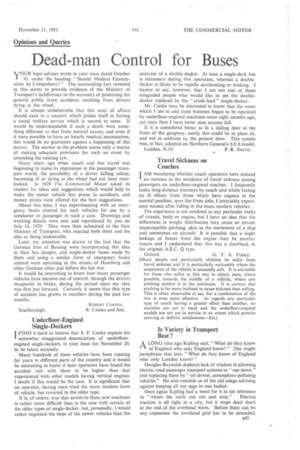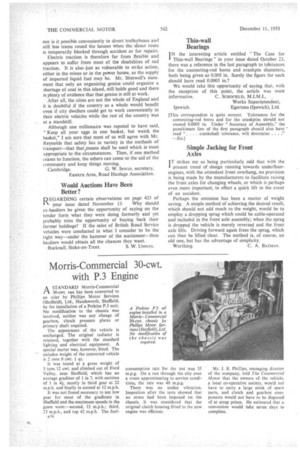Dead-man Control for Buses
Page 69

Page 70

If you've noticed an error in this article please click here to report it so we can fix it.
VOUR legal adviser •wrote in your issue datedOctober 1 30, under the heading ".Should Medical Examination be compulsory?" The outstanding fact revealed in this seems to provide evidence of the Ministry of Transport's indifference to -the necessity of protecting the general public from accidents resulting from drivers dying at the wheel.
It is almost unbelievable that this state •of affairs should exist in a country which prides itself in having a social welfare service which is second to none. It would be understandable if such a death were something different to that from natural causes, and even if it were possible to have an hourly medical examination, this would be no guarantee against a happening of this nature. The answer to the problem seems only a matter of making adequate provision for such an event by amending the existing law.
Many years ago when coach and bus travel was beginning to make its impression in the passenger transport world, the possibility of a driver falling asleep, becoming ill or dying at the wheel had not been overlooked. In 1929 The Commercial Motor asked its readers for ideas and suggestions which would help to make the motor vehicle less prone to .accidents, and• money prizes were offered for the best suggestions.
About this time, I was experimenting with an emergency brake control for such vehicles for use by a conductor or passenger in such a case. Drawings and working details were sent and reproduced by you on July 16, 1929. They were then submitted to the then Minister of Transport, wtio rejected both them and the idea as being undesirable.
Later, my attention was drawn to the fact that the German firm of Bussing were incorporating this idea in their bus designs, and single-decker buses made by them and using a similar form of emergency brake control were operating in' the streets of Hamburg and other German cities just before the last war.
It would be interesting to know .how many passenger 'vehicles have become out of control, through the drivers incapacity to brake, during the period since my idea was first put forward. Certainly it seems that this type of accident has grown in numbers during the past few months.
ROBERT COATES, Scarborough. R. Coates and Son.
Underfloor-Engined Single-Deckers
I FIND it hard to believe that S. F. Cooke expects his I somewhat exaggerated denunciation • of underfloorengined single-deckers, in your issue for November 20, to be taken seriously.
Many hundreds of these vehicles have been running for years in different parts of the country and it would be interesting to know if their operators have found the accident rate with them to be higher than that experienced with other models having vertical engines. Idoubt if this would be the case. It is significant that no operator, having once tried the more modern form of vehicle, has reverted to the older type: It is,. of course, true that access to these new machines is rather more difficult than is the case with certain of the older types of single-decker, but, personally, I would rather negotiate the steps of the newer vehicles than the staircase of a double-dee,ker. At least a single-deck bus is stationary during this operation, whereas a doubledecker is likely to be rapidly accelerating or braking. I hasten to say, however, that I am not one of those misguided people who would like to see the doubledecker replaced by the "crush-load " single-decker.
• Mr. Cooke may be interested to know that the route which I use to and from business began to be operated by underfloor-engined machines some eight months ago, yet since then I have never seen anyone fall.
If it is considered better to fit a sliding door at the front of the gangway, surely this could be in place of, and not in addition to, the present door. This system was, in fact, adopted on Northern General's S.E.6 model.
London, N.10. P. R. SMITH:
Travel, Sickness on Coaches
I AM wondering whether coach operators have noticed I an increase in the incidence of travel sickness among passengers on underfloor-engined coaches. I frequently make long-distance journeys by coach and whilst feeling no ill effects from those which have engines in the normal position, over the front axle., I invariably experience nausea after riding in the more modern vehicles.
The experience is not confined to any particular make of chassis, body or engine, but I have an idea that the differences in weight distribution may cause an almost imperceptible pitching, akin to the movement of a ship and sometimes an aircraft. It is possible that a slight leakage of fumes from the engine may be another reason and I understand that this was a drawback in the original. A.E.C. Q type.
Oxford. G. T. A. YonkE.
[Many people and particularly children do suffer from travel sickness and it is particularly noticeable where the suspension of the vehicle is unusually soft. It is .advisable for those who suffer in this way to obtain seats, where possible, . towards the middle of a vehicle, where any pitching motion is at the minimum. It is curious that pitching is far more inclined to cause sickness than rolling. This is often observable at sea, but a combination of the two is even more effective. As regards any particular type of coach having a greater effect than another, no statistics are yet to hand and the underfloor-engined models are not yet in service to an extent which permits arriving at definite conclusions.—Ea]
Is Variety in Transport Best ?
ALONG time ago Kipling said, "What do they know of England who only England know? One might paraphrase that into, "What do they know of England who only London know?
Douglas Reynolds deplores lack of wisdom in allowing electric road passenger transport systems to "run down" and replacing them by "oil-driven, atmosphere-polluting vehicles." He also reminds us of the old adage advising against keeping all our eggs in one basket.
Once again Kipling had a word for it in his reference to "where the trails run out and stop." Electric traction is all right in a city, but it: stopsdead short at the end of the overhead wires. Before there can be any expansion the overhead grid has to be extended: nor is it possible conveniently to divert trolleybuses and still less trams round the houses when the direct route is temporarily blocked through accident or for repairs.
Electric traction is therefore far from flexible and appears to suffer from most of the disabilities of rail traction. It is also-just as vulnerable to strike action, either in the mines or in the power house, as the supply of imported liquid fuel may be. Mr. Shinwell's statement that only an organizing genius could organize a shortage of coal in this island, still holds good and there is plenty of evidence that that genius is still at work. After all, the cities are not the whole of England and it is doubtful if the country as a whole would benefit even if city dwellers could get to work conveniently in their electric vehicles while the rest of the country was at a standstill.
Although one millionaire was reputed to have said, "Keep all your eggs in one basket, but watch the basket," I am sure that most of us will agree with Mr. Reynolds that safety lies in variety in the methods of transport—that that,means shall be used which is most appropriate to the circumstances. Then, if one method ceases to function, the others can come to the aid of the community and keep things moving.
Cambridge. G. W. IRWIN, secretary, Eastern Area, Road Haulage Association.
Would Auctions Have Been Better?
REGARDING certain observations on page 423 of your issue dated November 13. Why should ex-hauliers be given the opportunity of saying on the tender form what they were doing formerly and yet probably miss the opportunity of buying back their former holdings? If the sales of British Road Service vehicles were conducted in what I consider to be the right way—under the hammer of the auctioneer—then hauliers would obtain all the chances they want.
Bucknall, Stoke-on-Trent. S. W. UNWIN.




















































































































